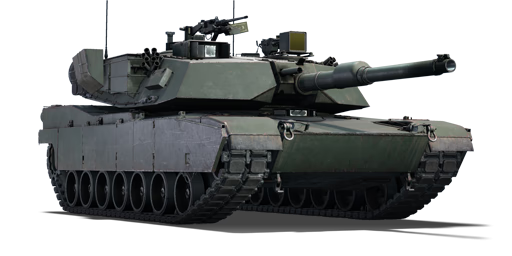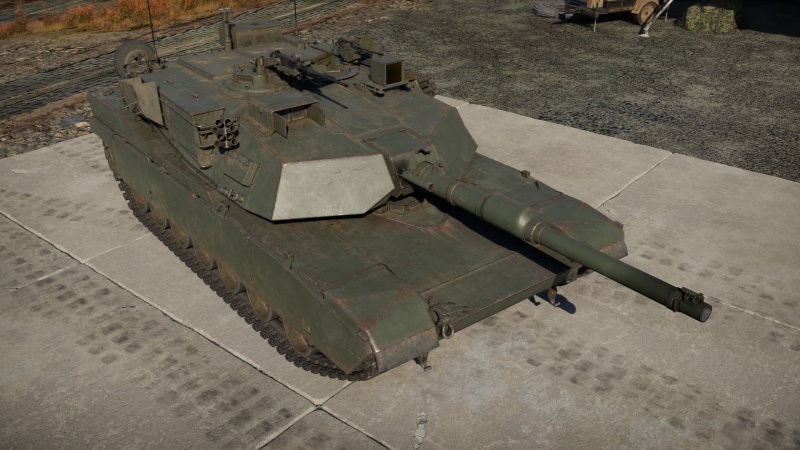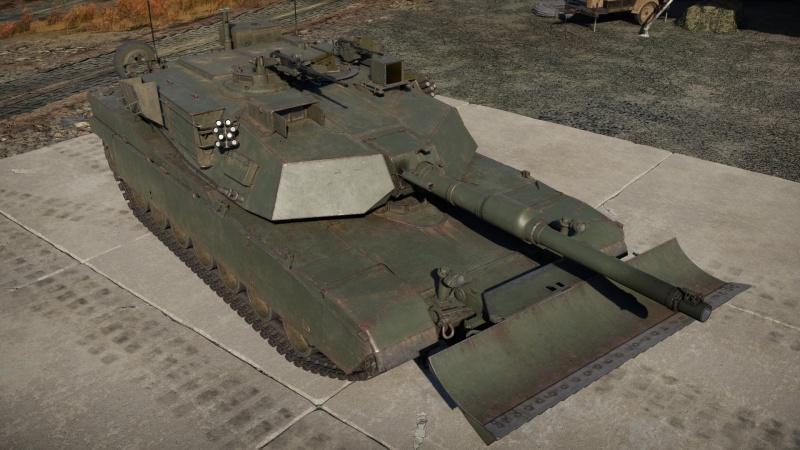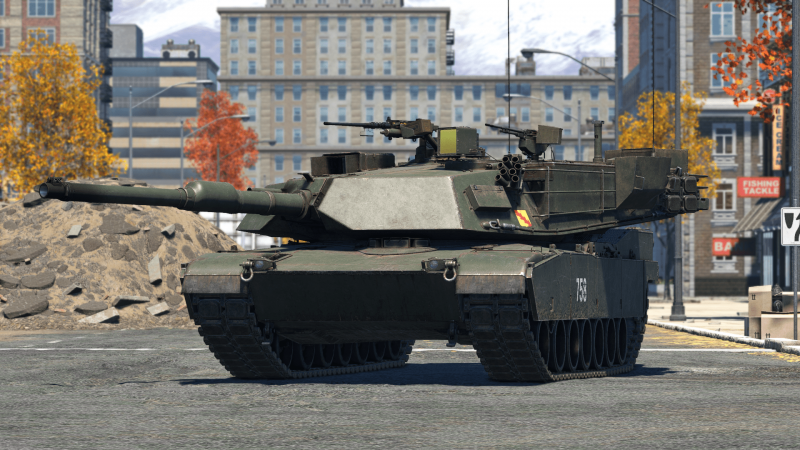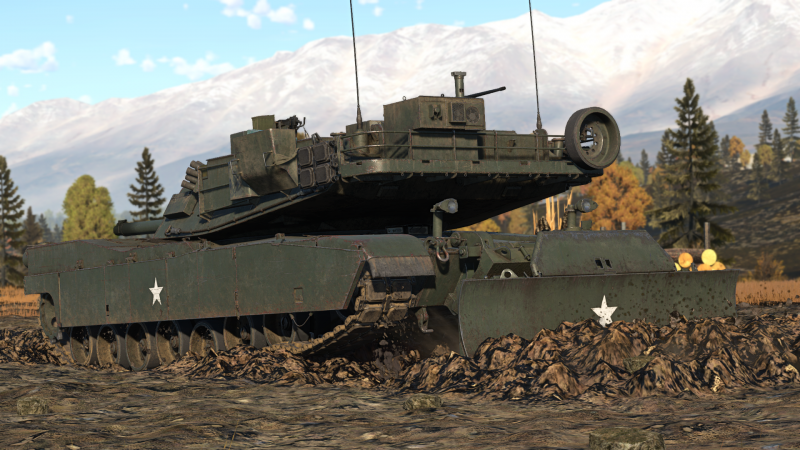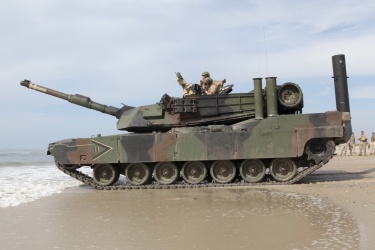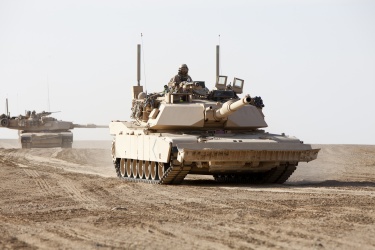Difference between revisions of "M1A1 HC"
Colok76286 (talk | contribs) (Edits) |
m (→Main armament) |
||
| (11 intermediate revisions by 7 users not shown) | |||
| Line 6: | Line 6: | ||
{{Specs-Card | {{Specs-Card | ||
|code=us_m1a1_hc_abrams | |code=us_m1a1_hc_abrams | ||
| − | |images={{Specs-Card-Image|GarageImage_{{PAGENAME}}.jpg|ArtImage_{{PAGENAME}}.png}} | + | |images={{Specs-Card-Image|GarageImage_{{PAGENAME}}.jpg|GarageImage_{{PAGENAME}}_Dozer.jpg|ArtImage_{{PAGENAME}}.png|ArtImage2_{{PAGENAME}}.png}} |
}} | }} | ||
== Description == | == Description == | ||
<!-- ''In the description, the first part should be about the history of the creation and combat usage of the vehicle, as well as its key features. In the second part, tell the reader about the ground vehicle in the game. Insert a screenshot of the vehicle, so that if the novice player does not remember the vehicle by name, he will immediately understand what kind of vehicle the article is talking about.'' The text within these arrows are not to be deleted --> | <!-- ''In the description, the first part should be about the history of the creation and combat usage of the vehicle, as well as its key features. In the second part, tell the reader about the ground vehicle in the game. Insert a screenshot of the vehicle, so that if the novice player does not remember the vehicle by name, he will immediately understand what kind of vehicle the article is talking about.'' The text within these arrows are not to be deleted --> | ||
| − | + | In the mid-1980s, the US Marine Corps (USMC) considered the M1 Abrams as a replacement to their M60A1 tank fleet. Requesting some modifications to better suit the USMC purposes, the M1A1 Abrams incorporating the changes began production in November 1990. As this new design was used and sent to both US Army and USMC, the tanks became known as the M1A1 HC within the US Army, with "HC" standing for "Heavy Common". The USMC simply referred to the tank as the "Common". | |
| − | The {{ | + | The '''{{Specs|name}}''', introduced in [[Update "Direct Hit"]], is an upgrade of the preceding [[M1A1 Abrams]]. It has armour improvements due to incorporating the "Heavy Armor" (HA) upgrade that includes depleted uranium inserts. The firepower is also improved with access to the M830A1 HEATFS round that includes a proximity fuse, meaning it is useful not only on enemy armoured vehicles, but also low-flying aircraft to swat them out of the sky. The mobility of the M1A1 HC is not too different from its predecessors. For users who have enjoyed the M1A1 Abrams gameplay, the M1A1 HC features improved capabilities to make the most of the firepower, armour, and mobility of the Abrams platform. |
== General info == | == General info == | ||
| Line 19: | Line 19: | ||
{{Specs-Tank-Armour}} | {{Specs-Tank-Armour}} | ||
<!-- ''Describe armour protection. Note the most well protected and key weak areas. Appreciate the layout of modules as well as the number and location of crew members. Is the level of armour protection sufficient, is the placement of modules helpful for survival in combat? If necessary use a visual template to indicate the most secure and weak zones of the armour.'' The text within these arrows are not to be deleted --> | <!-- ''Describe armour protection. Note the most well protected and key weak areas. Appreciate the layout of modules as well as the number and location of crew members. Is the level of armour protection sufficient, is the placement of modules helpful for survival in combat? If necessary use a visual template to indicate the most secure and weak zones of the armour.'' The text within these arrows are not to be deleted --> | ||
| − | The armour of the M1A1 HC is a drastic improvement from its predecessor. Like the succeeding M1A2, the M1A1 HC has 2nd generation depleted uranium (DU) inserts in the turret, making the turret practically impervious to most attacks. It also retains the same crew layout of its predecessors along with the blowout ammo rack, meaning it is quite survivable. The hull remains unchanged however, and due to the increase in BR, most enemies will be able to penetrate it even at long range. | + | The armour of the M1A1 HC is a drastic improvement from its predecessor. Like the succeeding M1A2, the M1A1 HC has 2nd generation depleted uranium (DU) inserts in the turret, making the turret practically impervious to most attacks. It also retains the same crew layout of its predecessors along with the blowout ammo rack, meaning it is quite survivable. The hull remains unchanged however, and due to the increase in BR, most enemies will be able to penetrate it even at long range. |
'''Armour type:''' <!-- The types of armour present on the vehicle and their general locations --> | '''Armour type:''' <!-- The types of armour present on the vehicle and their general locations --> | ||
| Line 65: | Line 65: | ||
|- | |- | ||
! ''Arcade'' | ! ''Arcade'' | ||
| − | | rowspan="2" | 40 || rowspan="2" | -10°/+20° || rowspan="2" | ±180° || rowspan="2" | Two-plane || 38.1 || 52.7 || 64.0 || 70.8 || 75.3 || rowspan="2" | | + | | rowspan="2" | 40 || rowspan="2" | -10°/+20° || rowspan="2" | ±180° || rowspan="2" | Two-plane || 38.1 || 52.7 || 64.0 || 70.8 || 75.3 || rowspan="2" | 6.50 || rowspan="2" | 5.75 || rowspan="2" | 5.30 || rowspan="2" | 5.00 |
|- | |- | ||
! ''Realistic'' | ! ''Realistic'' | ||
| Line 75: | Line 75: | ||
The M1A1 HC is armed with the same 120 mm M256 smoothbore gun as the M1A1 and has access to the same ammunition of APFSDS and HEATFS. However, the M1A1 HC also gets access to a new HEATFS shell, M830A1. The M829A1 APFSDS round is an excellent anti-tank munition, boasting high penetration figures, at 598 mm of flat penetration at point-blank and decreasing to just 560 mm at 2 km. Its angled performance is also excellent, penetrating 346 mm of armour at 60 degrees point-blank and 324 mm at 2 km. It is sufficient to reliably engage any vehicle in the game frontally. The M830 HEATFS shell penetrates a meagre 480 mm of armour. It is not recommended to use this shell after unlocking the M829. The M830A1 is a special type of HEATFS round. Instead of using a conventional impact fuse, M830A1 is a sub-calibre HEATFS round that has been saboted into a 120 mm casing and fitted with a proximity fuse. This allows it to effectively engage low flying aircraft and helicopters up to a range of 4.5 km. The sub-calibre nature of the round means it travels extremely quickly at 1,400 m/s. However, its effectiveness against armoured vehicles is limited as it penetrates a mere 350 mm of armour. | The M1A1 HC is armed with the same 120 mm M256 smoothbore gun as the M1A1 and has access to the same ammunition of APFSDS and HEATFS. However, the M1A1 HC also gets access to a new HEATFS shell, M830A1. The M829A1 APFSDS round is an excellent anti-tank munition, boasting high penetration figures, at 598 mm of flat penetration at point-blank and decreasing to just 560 mm at 2 km. Its angled performance is also excellent, penetrating 346 mm of armour at 60 degrees point-blank and 324 mm at 2 km. It is sufficient to reliably engage any vehicle in the game frontally. The M830 HEATFS shell penetrates a meagre 480 mm of armour. It is not recommended to use this shell after unlocking the M829. The M830A1 is a special type of HEATFS round. Instead of using a conventional impact fuse, M830A1 is a sub-calibre HEATFS round that has been saboted into a 120 mm casing and fitted with a proximity fuse. This allows it to effectively engage low flying aircraft and helicopters up to a range of 4.5 km. The sub-calibre nature of the round means it travels extremely quickly at 1,400 m/s. However, its effectiveness against armoured vehicles is limited as it penetrates a mere 350 mm of armour. | ||
| − | { | + | {{:M256 (120 mm)/Ammunition|M830, M830A1, M829, M829A1, M908}} |
| − | |||
| − | |||
| − | |||
| − | |||
| − | |||
| − | |||
| − | |||
| − | |||
| − | |||
| − | |||
| − | |||
| − | |||
| − | |||
| − | |||
| − | |||
| − | |||
| − | |||
| − | |||
| − | |||
| − | |||
| − | |||
| − | |||
| − | |||
| − | |||
| − | |||
| − | |||
| − | |||
| − | |||
| − | |||
| − | |||
| − | |||
| − | | M830 | ||
| − | |||
| − | |||
| − | |||
| − | |||
| − | |||
| − | |||
| − | |||
| − | |||
==== [[Ammo racks]] ==== | ==== [[Ammo racks]] ==== | ||
| Line 162: | Line 122: | ||
== Usage in battles == | == Usage in battles == | ||
<!-- ''Describe the tactics of playing in the vehicle, the features of using vehicles in the team and advice on tactics. Refrain from creating a "guide" - do not impose a single point of view but instead give the reader food for thought. Describe the most dangerous enemies and give recommendations on fighting them. If necessary, note the specifics of the game in different modes (AB, RB, SB).'' The text within these arrows are not to be deleted --> | <!-- ''Describe the tactics of playing in the vehicle, the features of using vehicles in the team and advice on tactics. Refrain from creating a "guide" - do not impose a single point of view but instead give the reader food for thought. Describe the most dangerous enemies and give recommendations on fighting them. If necessary, note the specifics of the game in different modes (AB, RB, SB).'' The text within these arrows are not to be deleted --> | ||
| − | The M1A1 HC is essentially the [[M1A2 Abrams|M1A2]] without the CITV but with a soft-kill active protection system (APS) that is only useful against early missiles but useless against laser-guided missiles like Hellfires or Vikhrs. The M1A1 HC also has good acceleration which allows for flanking manoeuvres. Due to its increased turret protection and better APFSDS round, it is also suited for sniping at long ranges especially when hull down. With a higher BR than its predecessor, it faces tanks that have no problem penetrating its hull necessitating proper utilization of hard cover found in maps. Its M829A1 round allows it to more comfortably engage targets at range and penetrate armour more reliably up close. | + | The M1A1 HC is essentially the [[M1A2 Abrams|M1A2]] without the CITV but with a soft-kill active protection system (APS) that is only useful against early missiles but useless against laser-guided missiles like Hellfires or Vikhrs. The M1A1 HC also has good acceleration which allows for flanking manoeuvres. Due to its increased turret protection and better APFSDS round, it is also suited for sniping at long ranges especially when hull down. With a higher BR than its predecessor, it faces tanks that have no problem penetrating its hull necessitating proper utilization of hard cover found in maps. Its M829A1 round allows it to more comfortably engage targets at range and penetrate armour more reliably up close. |
=== Pros and cons === | === Pros and cons === | ||
| Line 183: | Line 143: | ||
<!-- ''Describe the history of the creation and combat usage of the vehicle in more detail than in the introduction. If the historical reference turns out to be too long, take it to a separate article, taking a link to the article about the vehicle and adding a block "/History" (example: <nowiki>https://wiki.warthunder.com/(Vehicle-name)/History</nowiki>) and add a link to it here using the <code>main</code> template. Be sure to reference text and sources by using <code><nowiki><ref></ref></nowiki></code>, as well as adding them at the end of the article with <code><nowiki><references /></nowiki></code>. This section may also include the vehicle's dev blog entry (if applicable) and the in-game encyclopedia description (under <code><nowiki>=== In-game description ===</nowiki></code>, also if applicable).'' --> | <!-- ''Describe the history of the creation and combat usage of the vehicle in more detail than in the introduction. If the historical reference turns out to be too long, take it to a separate article, taking a link to the article about the vehicle and adding a block "/History" (example: <nowiki>https://wiki.warthunder.com/(Vehicle-name)/History</nowiki>) and add a link to it here using the <code>main</code> template. Be sure to reference text and sources by using <code><nowiki><ref></ref></nowiki></code>, as well as adding them at the end of the article with <code><nowiki><references /></nowiki></code>. This section may also include the vehicle's dev blog entry (if applicable) and the in-game encyclopedia description (under <code><nowiki>=== In-game description ===</nowiki></code>, also if applicable).'' --> | ||
===Development & Procurement=== | ===Development & Procurement=== | ||
| − | Though the [[M1 Abrams]] became accepted into service of the United States Army in November 1981,<ref name="Green_Abrams1">Green 2015, Loc 241 of 1808</ref> the United States Marines Corps (USMC) were not able to immediately look into procurement of the Abrams tanks due to budget. It was not until February 1985 that | + | Though the [[M1 Abrams]] became accepted into service of the United States Army in November 1981,<ref name="Green_Abrams1">Green 2015, Loc 241 of 1808</ref> the United States Marines Corps (USMC) were not able to immediately look into procurement of the Abrams tanks due to budget constraints. It was not until February 1985 that Commandant of the Marine Corps Gen. Paul Kelly sought to officially replace the [[M60A1 (AOS)|M60A1]] in USMC service with the [[M1A1 Abrams]], with plans for 490 M1A1 to replace 760 M60A1 beginning in November 1990.<ref name="Green_Abrams2">Green 2015, Loc 1187-1201 of 1808</ref> |
[[File:M1A1 HC V18 amphibious assault 130519-M-DA099-026.jpg|x250px|right|none|thumb|A USMC M1A1 HC in an amphibious exercise. The ability of the M1A1 to accept a deep water fording kit, a feature the USMC requested, is an indicator of a "Heavy Common" variant.]] | [[File:M1A1 HC V18 amphibious assault 130519-M-DA099-026.jpg|x250px|right|none|thumb|A USMC M1A1 HC in an amphibious exercise. The ability of the M1A1 to accept a deep water fording kit, a feature the USMC requested, is an indicator of a "Heavy Common" variant.]] | ||
| − | The USMC's plan to acquire the M1A1 (or the M1A1 {{Annotation|HA|Heavy Armor}} model with {{Annotation|DU|depleted uranium}} armour since October 1988<ref name="AFVDB_Abrams">Conners 2021</ref>) also requested design changes to the tank to fit the USMC's needs. These requests culminated to eighty engineering changes, such as deep-wading adapters for fording kits, stronger chain tie-downs, and a position location reference system.<ref name="Green_Abrams2" /><ref name="AFVDB_Abrams" /><ref name="Zaloga_M1vsT72">Zaloga 2009, Loc 908-916 of 1274</ref> Instead of producing this modified Abrams tank just for the USMC, | + | The USMC's plan to acquire the M1A1 (or the M1A1 {{Annotation|HA|Heavy Armor}} model with {{Annotation|DU|depleted uranium}} armour since October 1988<ref name="AFVDB_Abrams">Conners 2021</ref>) also requested design changes to the tank to fit the USMC's needs. These requests culminated to eighty engineering changes, such as deep-wading adapters for fording kits, stronger chain tie-downs, and a position location reference system.<ref name="Green_Abrams2" /><ref name="AFVDB_Abrams" /><ref name="Zaloga_M1vsT72">Zaloga 2009, Loc 908-916 of 1274</ref> Instead of producing this modified Abrams tank just for the USMC, {{Annotation|GDLS|General Dynamic Land Systems}} integrated these changes into the overall M1A1 HA production lines beginning in November 1990. These new M1A1s were not distinguished by the service branch, being sent to both the US Army and US Marine Corps. As such, the US Army began referring to the M1A1s produced after November 1990 as the '''M1A1 HC''', with '''HC''' for "'''H'''eavy '''C'''ommon" in reference to the commonality of the M1A1 HA tank design between the service branches. The USMC came to referencing the tank as the '''M1A1 Common''', while referring to any pre-November 1990 builds of the M1A1 HA as a "Plain Jane".<ref name="Green_Abrams2" /> The primary distinction between a US Army and a US Marine Corps M1A1 HC is the smoke grenade launchers, the US Army uses the M250 smoke grenade launcher while the USMC uses the M257 smoke grenade launcher.<ref name="inetres_smoke">Cooke 2008</ref> |
Though the USMC requested for 490 M1A1 HC tanks, they would only receive 269 units by the delivery end date of 1992.<ref name="Green_Abrams2" /> An insufficient number for their needs, the USMC would receive additional support from US Congress between 1994 to 1995, which allocated enough funding for the transfer of 134 M1A1 tanks from the US Army. As these were "Plain Jane" M1A1 HAs, an upgrade program was started between 1995 to 1997 to apply "Common" design changes into the "Plain Janes". Another transfer would occur in between 2002 to 2005 for 181 M1A1 HA from the US Army to the USMC, which were likewise modified to HC standards.<ref name="Green_Abrams3">Green 2015, Loc 1201-1208 of 1808</ref> | Though the USMC requested for 490 M1A1 HC tanks, they would only receive 269 units by the delivery end date of 1992.<ref name="Green_Abrams2" /> An insufficient number for their needs, the USMC would receive additional support from US Congress between 1994 to 1995, which allocated enough funding for the transfer of 134 M1A1 tanks from the US Army. As these were "Plain Jane" M1A1 HAs, an upgrade program was started between 1995 to 1997 to apply "Common" design changes into the "Plain Janes". Another transfer would occur in between 2002 to 2005 for 181 M1A1 HA from the US Army to the USMC, which were likewise modified to HC standards.<ref name="Green_Abrams3">Green 2015, Loc 1201-1208 of 1808</ref> | ||
===Combat usage=== | ===Combat usage=== | ||
| − | The USMC's stock of M1A1 Abrams tank would see first use during the 1991 Gulf War. However, their primary tank deployed to the theater was the [[M60A1 RISE (P)]] as they were still procuring and transitioning to the M1A1 tanks. To bolster the Marine's number of Abrams, the US Army provided 60 "Plain Jane" M1A1 HA | + | The USMC's stock of M1A1 Abrams tank would see first use during the 1991 Gulf War. However, their primary tank deployed to the theater was the [[M60A1 RISE (P)]] as they were still procuring and transitioning to the M1A1 tanks. To bolster the US Marine's number of Abrams, the US Army provided 60 "Plain Jane" M1A1 HA to the US Marine's 2nd Tank Battalion while the two companies of the 4th Tank Battalion of the USMC Reserve was equipped with 16 of the newer M1A1 HC. As such, the Abrams made up of 76 of the total 353 USMC tanks in the Gulf War, the rest of which was composed of M60A1s.<ref name="Zaloga_M1vsT72" /> |
[[File:USMC M1A1 Afghanistan - DIVDSHUB 364427.jpg|x250px|left|thumb|Two M1A1 HC of the USMC in Helmand province, Afghanistan. The front tank has a dozer blade attached. The two large cylindrical antennas on the turret bustle of each tank is for the CREW-1 jammer unit.]] | [[File:USMC M1A1 Afghanistan - DIVDSHUB 364427.jpg|x250px|left|thumb|Two M1A1 HC of the USMC in Helmand province, Afghanistan. The front tank has a dozer blade attached. The two large cylindrical antennas on the turret bustle of each tank is for the CREW-1 jammer unit.]] | ||
The USMC's Abrams were committed into action during the ground phase of Operation Desert Storm. 4th Tank Battalion's Bravo Company<!--Zaloga's 2009 source state it was 2nd Tank Battalion's Bravo company (meaning a M1A1 HA engagement), but more recent sources state it was the reserve 4th Tank Battalion's Bravo company--> saw action in the pre-dawn hours of February 25th when a T-72 battalion from the 3rd Saladin Armored Division approached their location.<ref name="Zaloga_M1vsT72combat">Zaloga 2009, Loc 1160-1168 of 1274</ref><ref name="NHHC_Feb1991">Naval History and Heritage Command 2015</ref> The M1A1 HCs, benefitting from their thermal imager gun sights, were able to engage and decimate the battalion, destroying up to 34 of the 35 total T-72 tanks in a span of 90 seconds.<ref name="NHHC_Feb1991" /><ref name="Green_Abrams4">Green 2015, Loc 1214 of 1808</ref> One crew was even credited with hitting seven tanks with seven rounds in about a minute.<ref name="Zaloga_M1vsT72combat" /> | The USMC's Abrams were committed into action during the ground phase of Operation Desert Storm. 4th Tank Battalion's Bravo Company<!--Zaloga's 2009 source state it was 2nd Tank Battalion's Bravo company (meaning a M1A1 HA engagement), but more recent sources state it was the reserve 4th Tank Battalion's Bravo company--> saw action in the pre-dawn hours of February 25th when a T-72 battalion from the 3rd Saladin Armored Division approached their location.<ref name="Zaloga_M1vsT72combat">Zaloga 2009, Loc 1160-1168 of 1274</ref><ref name="NHHC_Feb1991">Naval History and Heritage Command 2015</ref> The M1A1 HCs, benefitting from their thermal imager gun sights, were able to engage and decimate the battalion, destroying up to 34 of the 35 total T-72 tanks in a span of 90 seconds.<ref name="NHHC_Feb1991" /><ref name="Green_Abrams4">Green 2015, Loc 1214 of 1808</ref> One crew was even credited with hitting seven tanks with seven rounds in about a minute.<ref name="Zaloga_M1vsT72combat" /> | ||
| − | The M1A1 HC would continue to see use wherever the USMC deployed their armoured units, such as in Operation Iraqi Freedom and Operation Enduring Freedom. The M1A1 HC's usage in Afghanistan stand out as the US Army did not bring any Abrams, and were present from 2011 to 2013. The tanks deployed to these two operations are distinguished by the fitting of a CREWS 1 electronic receiver/jammer unit, intended to prevent the transmission of frequencies from detonating improvised explosive devices (IED). These are distinguished by two large antennas usually located at the turret rear.<ref name="Green_Abrams5">Green 2015, Loc 1222-1258 of 1808</ref> | + | The M1A1 HC would continue to see use wherever the USMC deployed their armoured units, such as in Operation Iraqi Freedom in Iraq and Operation Enduring Freedom in Afghanistan. The M1A1 HC's usage in Afghanistan stand out as the US Army did not bring any Abrams, and the Abrams were present from 2011 to 2013. The tanks deployed to these two operations are distinguished by the fitting of a CREWS 1 electronic receiver/jammer unit, intended to prevent the transmission of electronic frequencies from detonating improvised explosive devices (IED). These are distinguished by two large antennas usually located at the turret rear.<ref name="Green_Abrams5">Green 2015, Loc 1222-1258 of 1808</ref> |
===Further upgrades and the Future=== | ===Further upgrades and the Future=== | ||
The USMC stuck with the M1A1 HC throughout its service life, lacking the budget to upgrade to the US Army's [[M1A2 Abrams]]. However, the USMC integrated several M1A2 and other US Army features such as the Stabilized Commander's Weapon Station (SCWS) and Tank-Infantry Phone (TIP). One unique upgrade the USMC implemented on their tanks was the Abrams Suspension Upgrade (ASU), intended to improve the Abrams' supported weight to 77 tons. A Firepower Enhancement Program (FEP) was also implemented to improve the fire control system and {{annotation|IFF|Identification friend or foe}} recognition.<ref name="Green_Abrams5" /> | The USMC stuck with the M1A1 HC throughout its service life, lacking the budget to upgrade to the US Army's [[M1A2 Abrams]]. However, the USMC integrated several M1A2 and other US Army features such as the Stabilized Commander's Weapon Station (SCWS) and Tank-Infantry Phone (TIP). One unique upgrade the USMC implemented on their tanks was the Abrams Suspension Upgrade (ASU), intended to improve the Abrams' supported weight to 77 tons. A Firepower Enhancement Program (FEP) was also implemented to improve the fire control system and {{annotation|IFF|Identification friend or foe}} recognition.<ref name="Green_Abrams5" /> | ||
| − | In 2020, the United States Marine Corps was reorganized under Commandant Gen. David Berger as part of Force Design 2030, with the decision made to deactivate all tank units under the USMC.<ref name="Military_TankGone">Harkins Mar. 2020</ref> The process began in July with 4th Tank Battalion's deactivation and ended in on 21 May 2021 with the 1st Tank Battalion's deactivation.<ref name="Military_4thTank">Harkins Jul. 2020</ref><ref name="USMC_1stTank">Athey 2021</ref> The 452 M1A1 HC tanks in USMC inventory are to be transferred to the US Army by 2023.<ref name="USMC_TankEnd">South 2021</ref> | + | In 2020, the United States Marine Corps was reorganized under Commandant Gen. David Berger as part of Force Design 2030, with the decision made to deactivate all tank units under the USMC.<ref name="Military_TankGone">Harkins Mar. 2020</ref> The process began in July with 4th Tank Battalion's deactivation and ended in on 21 May 2021 with the 1st Tank Battalion's deactivation.<ref name="Military_4thTank">Harkins Jul. 2020</ref><ref name="USMC_1stTank">Athey 2021</ref> The 452 M1A1 HC tanks in USMC inventory are to be transferred to the US Army by 2023.<ref name="USMC_TankEnd">South 2021</ref> Should tanks be required to support USMC operations in the future, it is expected that the US Army's M1 Abrams can provide the needed capabilities.<ref name="USMC_ForceDesign2030">Commandment of the Marine Corps 2020, 8</ref> |
== Media == | == Media == | ||
| Line 233: | Line 193: | ||
=== References === | === References === | ||
| + | |||
;Citations | ;Citations | ||
<references /> | <references /> | ||
| Line 240: | Line 201: | ||
* Athey, Philip. "Marine Corps deactivates its final active-duty tank battalion". ''Marine Corps Times'', 25 May 2021, [https://www.marinecorpstimes.com/news/your-marine-corps/2021/05/25/marine-corps-deactivates-its-final-active-duty-tank-battalion/ Website]. Accessed 14 Nov. 2021 ([https://web.archive.org/web/20211114234337/https://www.marinecorpstimes.com/news/your-marine-corps/2021/05/25/marine-corps-deactivates-its-final-active-duty-tank-battalion/ Archive]). | * Athey, Philip. "Marine Corps deactivates its final active-duty tank battalion". ''Marine Corps Times'', 25 May 2021, [https://www.marinecorpstimes.com/news/your-marine-corps/2021/05/25/marine-corps-deactivates-its-final-active-duty-tank-battalion/ Website]. Accessed 14 Nov. 2021 ([https://web.archive.org/web/20211114234337/https://www.marinecorpstimes.com/news/your-marine-corps/2021/05/25/marine-corps-deactivates-its-final-active-duty-tank-battalion/ Archive]). | ||
* Chief of Naval Operations. "THE UNITED STATES NAVY IN "DESERT SHIELD" / "DESERT STORM" » Appendix A: Chronology - February 1991". ''Naval History and Heritage Command'', 02 Mar. 2015, [https://www.history.navy.mil/research/library/online-reading-room/title-list-alphabetically/u/us-navy-in-desert-shield-desert-storm/february-1991.html Website]. Accessed 14 Nov. 2021 ([https://web.archive.org/web/20211114233638/https://www.history.navy.mil/research/library/online-reading-room/title-list-alphabetically/u/us-navy-in-desert-shield-desert-storm/february-1991.html Archive]). | * Chief of Naval Operations. "THE UNITED STATES NAVY IN "DESERT SHIELD" / "DESERT STORM" » Appendix A: Chronology - February 1991". ''Naval History and Heritage Command'', 02 Mar. 2015, [https://www.history.navy.mil/research/library/online-reading-room/title-list-alphabetically/u/us-navy-in-desert-shield-desert-storm/february-1991.html Website]. Accessed 14 Nov. 2021 ([https://web.archive.org/web/20211114233638/https://www.history.navy.mil/research/library/online-reading-room/title-list-alphabetically/u/us-navy-in-desert-shield-desert-storm/february-1991.html Archive]). | ||
| + | * Commandment of the Marine Corps. "Force Design 2030". ''Headquarters Marine Corps'', 26 Mar. 2020, [https://www.hqmc.marines.mil/Portals/142/Docs/CMC38%20Force%20Design%202030%20Report%20Phase%20I%20and%20II.pdf?ver=2020-03-26-121328-460 Website]. Accessed 19 Aug. 2022 ([https://web.archive.org/web/20220814083603/https://www.hqmc.marines.mil/Portals/142/Docs/CMC38%20Force%20Design%202030%20Report%20Phase%20I%20and%20II.pdf?ver=2020-03-26-121328-460 Archive]). | ||
* Conners, Chris. "M1 Abrams". ''American Fighting Vehicle Database'', 13 Nov. 2021, [http://afvdb.50megs.com/usa/m1abrams.html Website]. Accessed 14 Nov. 2021 ([https://web.archive.org/web/20211114233648/http://afvdb.50megs.com/usa/m1abrams.html Archive]). | * Conners, Chris. "M1 Abrams". ''American Fighting Vehicle Database'', 13 Nov. 2021, [http://afvdb.50megs.com/usa/m1abrams.html Website]. Accessed 14 Nov. 2021 ([https://web.archive.org/web/20211114233648/http://afvdb.50megs.com/usa/m1abrams.html Archive]). | ||
* Cooke, Gary W. "U.S. Vehicle Grenade Launchers". ''Gary's Place'', 03 May 2008, [https://www.inetres.com/gp/military/cv/weapon/launchers.html Website]. Accessed 14 Nov. 2021 ([https://web.archive.org/web/20211115001048/https://www.inetres.com/gp/military/cv/weapon/launchers.html Archive]). | * Cooke, Gary W. "U.S. Vehicle Grenade Launchers". ''Gary's Place'', 03 May 2008, [https://www.inetres.com/gp/military/cv/weapon/launchers.html Website]. Accessed 14 Nov. 2021 ([https://web.archive.org/web/20211115001048/https://www.inetres.com/gp/military/cv/weapon/launchers.html Archive]). | ||
| Line 250: | Line 212: | ||
{{TankManufacturer GDLS}} | {{TankManufacturer GDLS}} | ||
{{USA medium tanks}} | {{USA medium tanks}} | ||
| + | [[Category:Ground vehicles with active protection system]] | ||
Latest revision as of 09:45, 26 June 2024
| This page is about the American medium tank M1A1 HC. For other vehicles of the family, see M1 Abrams (Family). |
Contents
Description
In the mid-1980s, the US Marine Corps (USMC) considered the M1 Abrams as a replacement to their M60A1 tank fleet. Requesting some modifications to better suit the USMC purposes, the M1A1 Abrams incorporating the changes began production in November 1990. As this new design was used and sent to both US Army and USMC, the tanks became known as the M1A1 HC within the US Army, with "HC" standing for "Heavy Common". The USMC simply referred to the tank as the "Common".
The Tank, Combat, Full Tracked, 120-mm Gun M1A1 HC, introduced in Update "Direct Hit", is an upgrade of the preceding M1A1 Abrams. It has armour improvements due to incorporating the "Heavy Armor" (HA) upgrade that includes depleted uranium inserts. The firepower is also improved with access to the M830A1 HEATFS round that includes a proximity fuse, meaning it is useful not only on enemy armoured vehicles, but also low-flying aircraft to swat them out of the sky. The mobility of the M1A1 HC is not too different from its predecessors. For users who have enjoyed the M1A1 Abrams gameplay, the M1A1 HC features improved capabilities to make the most of the firepower, armour, and mobility of the Abrams platform.
General info
Survivability and armour
The armour of the M1A1 HC is a drastic improvement from its predecessor. Like the succeeding M1A2, the M1A1 HC has 2nd generation depleted uranium (DU) inserts in the turret, making the turret practically impervious to most attacks. It also retains the same crew layout of its predecessors along with the blowout ammo rack, meaning it is quite survivable. The hull remains unchanged however, and due to the increase in BR, most enemies will be able to penetrate it even at long range.
Armour type:
| Armour | Front (Slope angle) | Sides | Rear | Roof |
|---|---|---|---|---|
| Hull | ___ mm | ___ mm Top ___ mm Bottom |
___ mm | ___ - ___ mm |
| Turret | ___ - ___ mm Turret front ___ mm Gun mantlet |
___ - ___ mm | ___ - ___ mm | ___ - ___ mm |
| Cupola | ___ mm | ___ mm | ___ mm | ___ mm |
Notes:
Mobility
| Game Mode | Max Speed (km/h) | Weight (tons) | Engine power (horsepower) | Power-to-weight ratio (hp/ton) | |||
|---|---|---|---|---|---|---|---|
| Forward | Reverse | Stock | Upgraded | Stock | Upgraded | ||
| Arcade | 76 | 43 | 61.2 | 2533 | 2,898 | 41.39 | 47.35 |
| Realistic | 69 | 39 | 1343 | 1,519 | 21.94 | 24.82 | |
Modifications and economy
Armaments
Main armament
| 120 mm M256 | Turret rotation speed (°/s) | Reloading rate (seconds) | |||||||||||
|---|---|---|---|---|---|---|---|---|---|---|---|---|---|
| Mode | Capacity | Vertical | Horizontal | Stabilizer | Stock | Upgraded | Full | Expert | Aced | Stock | Full | Expert | Aced |
| Arcade | 40 | -10°/+20° | ±180° | Two-plane | 38.1 | 52.7 | 64.0 | 70.8 | 75.3 | 6.50 | 5.75 | 5.30 | 5.00 |
| Realistic | 23.8 | 28.0 | 34.0 | 37.6 | 40.0 | ||||||||
Ammunition
The M1A1 HC is armed with the same 120 mm M256 smoothbore gun as the M1A1 and has access to the same ammunition of APFSDS and HEATFS. However, the M1A1 HC also gets access to a new HEATFS shell, M830A1. The M829A1 APFSDS round is an excellent anti-tank munition, boasting high penetration figures, at 598 mm of flat penetration at point-blank and decreasing to just 560 mm at 2 km. Its angled performance is also excellent, penetrating 346 mm of armour at 60 degrees point-blank and 324 mm at 2 km. It is sufficient to reliably engage any vehicle in the game frontally. The M830 HEATFS shell penetrates a meagre 480 mm of armour. It is not recommended to use this shell after unlocking the M829. The M830A1 is a special type of HEATFS round. Instead of using a conventional impact fuse, M830A1 is a sub-calibre HEATFS round that has been saboted into a 120 mm casing and fitted with a proximity fuse. This allows it to effectively engage low flying aircraft and helicopters up to a range of 4.5 km. The sub-calibre nature of the round means it travels extremely quickly at 1,400 m/s. However, its effectiveness against armoured vehicles is limited as it penetrates a mere 350 mm of armour.
| Penetration statistics | |||||||
|---|---|---|---|---|---|---|---|
| Ammunition | Type of warhead |
Penetration @ 0° Angle of Attack (mm) | |||||
| 10 m | 100 m | 500 m | 1,000 m | 1,500 m | 2,000 m | ||
| M830 | HEATFS | 480 | 480 | 480 | 480 | 480 | 480 |
| M830A1 | HEAT MP | 350 | 350 | 350 | 350 | 350 | 350 |
| M829 | APFSDS | 491 | 488 | 481 | 473 | 464 | 454 |
| M829A1 | APFSDS | 598 | 596 | 589 | 580 | 570 | 560 |
| M908 | HE-OR | 300 | 300 | 300 | 300 | 300 | 300 |
| Shell details | ||||||||||||
|---|---|---|---|---|---|---|---|---|---|---|---|---|
| Ammunition | Type of warhead |
Velocity (m/s) |
Projectile mass (kg) |
Fuse delay (m) |
Fuse sensitivity (mm) |
Explosive mass (TNT equivalent) (kg) |
Ricochet | |||||
| 0% | 50% | 100% | ||||||||||
| M830 | HEATFS | 1,140 | 13.1 | 0.05 | 0.1 | 2.36 | 65° | 72° | 77° | |||
| M829 | APFSDS | 1,670 | 4.27 | - | - | - | 78° | 80° | 81° | |||
| M829A1 | APFSDS | 1,575 | 4.89 | - | - | - | 78° | 80° | 81° | |||
| M908 | HE-OR | 1,410 | 11.4 | 0.4 | 5 | 1.99 | 65° | 72° | 77° | |||
| Proximity-fused shell details | ||||||||||||
|---|---|---|---|---|---|---|---|---|---|---|---|---|
| Ammunition | Type of warhead |
Velocity (m/s) |
Projectile mass (kg) |
Fuse delay (m) |
Fuse sensitivity (mm) |
Arming distance (m) |
Trigger radius (m) |
Explosive mass (TNT equivalent) (kg) |
Ricochet | |||
| 0% | 50% | 100% | ||||||||||
| M830A1 | HEAT MP | 1,410 | 11.4 | 0.05 | 0.1 | 400 | 10 | 1.99 | 65° | 72° | 77° | |
Ammo racks
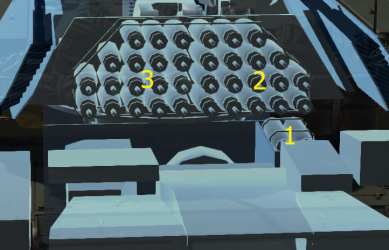
| Full ammo |
1st rack empty |
2nd rack empty |
3rd rack empty |
Visual discrepancy |
|---|---|---|---|---|
| 40 | 35 (+5) | 18 (+22) | 1 (+39) | No |
Machine guns
| 12.7 mm M2HB | ||||
|---|---|---|---|---|
| Mount | Capacity (Belt) | Fire rate | Vertical | Horizontal |
| Pintle (Commander) | 1,000 (200) | 577 | -9°/+65° | -160°/+180° |
| 7.62 mm M240 | ||||
|---|---|---|---|---|
| Mount | Capacity (Belt) | Fire rate | Vertical | Horizontal |
| Coaxial | 10,000 (200) | 941 | N/A | N/A |
| Pintle (Loader) | 1,400 (200) | 941 | -9°/+65° | -77°/+135° |
Usage in battles
The M1A1 HC is essentially the M1A2 without the CITV but with a soft-kill active protection system (APS) that is only useful against early missiles but useless against laser-guided missiles like Hellfires or Vikhrs. The M1A1 HC also has good acceleration which allows for flanking manoeuvres. Due to its increased turret protection and better APFSDS round, it is also suited for sniping at long ranges especially when hull down. With a higher BR than its predecessor, it faces tanks that have no problem penetrating its hull necessitating proper utilization of hard cover found in maps. Its M829A1 round allows it to more comfortably engage targets at range and penetrate armour more reliably up close.
Pros and cons
Pros:
- Powerful and versatile ammunition selection
- Has an active protection system that can provide protection against some ATGMs, also comes stock
- Better turret protection when compared to the M1A1
- M829 is a Tier I modification, with NVDs being Tier III
- Carries 4 charges of smoke grenades (4/16 compared to the 6/12 carried by its brothers)
Cons:
- No commander's sight
- APS is visible through night vision devices and cannot intercept modern ATGMs
History
Development & Procurement
Though the M1 Abrams became accepted into service of the United States Army in November 1981,[1] the United States Marines Corps (USMC) were not able to immediately look into procurement of the Abrams tanks due to budget constraints. It was not until February 1985 that Commandant of the Marine Corps Gen. Paul Kelly sought to officially replace the M60A1 in USMC service with the M1A1 Abrams, with plans for 490 M1A1 to replace 760 M60A1 beginning in November 1990.[2]
The USMC's plan to acquire the M1A1 (or the M1A1 HA model with DU armour since October 1988[3]) also requested design changes to the tank to fit the USMC's needs. These requests culminated to eighty engineering changes, such as deep-wading adapters for fording kits, stronger chain tie-downs, and a position location reference system.[2][3][4] Instead of producing this modified Abrams tank just for the USMC, GDLS integrated these changes into the overall M1A1 HA production lines beginning in November 1990. These new M1A1s were not distinguished by the service branch, being sent to both the US Army and US Marine Corps. As such, the US Army began referring to the M1A1s produced after November 1990 as the M1A1 HC, with HC for "Heavy Common" in reference to the commonality of the M1A1 HA tank design between the service branches. The USMC came to referencing the tank as the M1A1 Common, while referring to any pre-November 1990 builds of the M1A1 HA as a "Plain Jane".[2] The primary distinction between a US Army and a US Marine Corps M1A1 HC is the smoke grenade launchers, the US Army uses the M250 smoke grenade launcher while the USMC uses the M257 smoke grenade launcher.[5]
Though the USMC requested for 490 M1A1 HC tanks, they would only receive 269 units by the delivery end date of 1992.[2] An insufficient number for their needs, the USMC would receive additional support from US Congress between 1994 to 1995, which allocated enough funding for the transfer of 134 M1A1 tanks from the US Army. As these were "Plain Jane" M1A1 HAs, an upgrade program was started between 1995 to 1997 to apply "Common" design changes into the "Plain Janes". Another transfer would occur in between 2002 to 2005 for 181 M1A1 HA from the US Army to the USMC, which were likewise modified to HC standards.[6]
Combat usage
The USMC's stock of M1A1 Abrams tank would see first use during the 1991 Gulf War. However, their primary tank deployed to the theater was the M60A1 RISE (P) as they were still procuring and transitioning to the M1A1 tanks. To bolster the US Marine's number of Abrams, the US Army provided 60 "Plain Jane" M1A1 HA to the US Marine's 2nd Tank Battalion while the two companies of the 4th Tank Battalion of the USMC Reserve was equipped with 16 of the newer M1A1 HC. As such, the Abrams made up of 76 of the total 353 USMC tanks in the Gulf War, the rest of which was composed of M60A1s.[4]
The USMC's Abrams were committed into action during the ground phase of Operation Desert Storm. 4th Tank Battalion's Bravo Company saw action in the pre-dawn hours of February 25th when a T-72 battalion from the 3rd Saladin Armored Division approached their location.[7][8] The M1A1 HCs, benefitting from their thermal imager gun sights, were able to engage and decimate the battalion, destroying up to 34 of the 35 total T-72 tanks in a span of 90 seconds.[8][9] One crew was even credited with hitting seven tanks with seven rounds in about a minute.[7]
The M1A1 HC would continue to see use wherever the USMC deployed their armoured units, such as in Operation Iraqi Freedom in Iraq and Operation Enduring Freedom in Afghanistan. The M1A1 HC's usage in Afghanistan stand out as the US Army did not bring any Abrams, and the Abrams were present from 2011 to 2013. The tanks deployed to these two operations are distinguished by the fitting of a CREWS 1 electronic receiver/jammer unit, intended to prevent the transmission of electronic frequencies from detonating improvised explosive devices (IED). These are distinguished by two large antennas usually located at the turret rear.[10]
Further upgrades and the Future
The USMC stuck with the M1A1 HC throughout its service life, lacking the budget to upgrade to the US Army's M1A2 Abrams. However, the USMC integrated several M1A2 and other US Army features such as the Stabilized Commander's Weapon Station (SCWS) and Tank-Infantry Phone (TIP). One unique upgrade the USMC implemented on their tanks was the Abrams Suspension Upgrade (ASU), intended to improve the Abrams' supported weight to 77 tons. A Firepower Enhancement Program (FEP) was also implemented to improve the fire control system and IFF recognition.[10]
In 2020, the United States Marine Corps was reorganized under Commandant Gen. David Berger as part of Force Design 2030, with the decision made to deactivate all tank units under the USMC.[11] The process began in July with 4th Tank Battalion's deactivation and ended in on 21 May 2021 with the 1st Tank Battalion's deactivation.[12][13] The 452 M1A1 HC tanks in USMC inventory are to be transferred to the US Army by 2023.[14] Should tanks be required to support USMC operations in the future, it is expected that the US Army's M1 Abrams can provide the needed capabilities.[15]
Media
- Skins
- Videos
See also
External links
References
- Citations
- ↑ Green 2015, Loc 241 of 1808
- ↑ 2.0 2.1 2.2 2.3 Green 2015, Loc 1187-1201 of 1808
- ↑ 3.0 3.1 Conners 2021
- ↑ 4.0 4.1 Zaloga 2009, Loc 908-916 of 1274
- ↑ Cooke 2008
- ↑ Green 2015, Loc 1201-1208 of 1808
- ↑ 7.0 7.1 Zaloga 2009, Loc 1160-1168 of 1274
- ↑ 8.0 8.1 Naval History and Heritage Command 2015
- ↑ Green 2015, Loc 1214 of 1808
- ↑ 10.0 10.1 Green 2015, Loc 1222-1258 of 1808
- ↑ Harkins Mar. 2020
- ↑ Harkins Jul. 2020
- ↑ Athey 2021
- ↑ South 2021
- ↑ Commandment of the Marine Corps 2020, 8
- Bibliography
- Athey, Philip. "Marine Corps deactivates its final active-duty tank battalion". Marine Corps Times, 25 May 2021, Website. Accessed 14 Nov. 2021 (Archive).
- Chief of Naval Operations. "THE UNITED STATES NAVY IN "DESERT SHIELD" / "DESERT STORM" » Appendix A: Chronology - February 1991". Naval History and Heritage Command, 02 Mar. 2015, Website. Accessed 14 Nov. 2021 (Archive).
- Commandment of the Marine Corps. "Force Design 2030". Headquarters Marine Corps, 26 Mar. 2020, Website. Accessed 19 Aug. 2022 (Archive).
- Conners, Chris. "M1 Abrams". American Fighting Vehicle Database, 13 Nov. 2021, Website. Accessed 14 Nov. 2021 (Archive).
- Cooke, Gary W. "U.S. Vehicle Grenade Launchers". Gary's Place, 03 May 2008, Website. Accessed 14 Nov. 2021 (Archive).
- Green, Michael. Images of War: M1 Abrams Tanks - Rare Photographs From Wartime Archives. E-book ed., Pen & Sword Military, 2015. Kindle.
- Harkins, Gina. "Marines to Shut Down All Tank Units, Cut Infantry Battalions in Major Overhaul". Military Advantage, 23 Mar. 2020, Website. Accessed 14 Nov. 2021 (Archive).
- Harkins, Gina. "Marine Corps Begins Shutdown of All Tank Battalions". Military Advantage, 21 Jul 2020, Website. Accessed 14 Nov. 2021 (Archive).
- South, Todd. "Goodbye, tanks: How the Marine Corps will change, and what it will lose, by ditching its armor". Marine Corps Times, 22 Mar. 2021, Website. Accessed 14 Nov. 2021 (Archive).
- Zaloga, Steven J. M1 Abrams VS T-72 Ural - Operation Desert Storm 1991. E-book ed., Osprey Publishing Ltd., 2009. Kindle.
| General Dynamics Land Systems (GDLS) | |
|---|---|
| MBTs | IPM1 Abrams · M1A1 · M1A1 HC · M1A2 Abrams · M1A2 SEP |
| Tank destroyers | M1128 Stryker MGS |
| USA medium tanks | |
|---|---|
| M2 | M2 |
| M3 | M3 Lee · ▃Grant I |
| M4 | M4 · Calliope · M4A1 · M4A1 (76) W · M4A2 · M4A2 (76) W · M4A3 (105) · M4A3 (76) W · M4/T26 |
| M26 Pershing | T20 · T25 · M26 · M26 T99 · M26E1 |
| M46/47/48 Patton | M46 · M46 "Tiger" · M47 · M48A1 · T54E1 · T54E2 |
| M60 | M60 · M60A1 (AOS) · M60A1 RISE (P) · M60A2 · M60A3 TTS · M728 CEV · 120S |
| MBT-70 | MBT-70 · XM803 |
| M1 Abrams | XM1 (Chrysler) · XM1 (GM) |
| M1 Abrams · M1 KVT · IPM1 | |
| M1A1 · M1A1 HC · M1A1 Click-Bait | |
| M1A2 Abrams · M1A2 SEP · M1A2 SEP V2 | |
| Other | T95E1 |
| Australia | M1A1 AIM |
| Canada | M4A5 |
| Israel | ▃Magach 3 (ERA) · ▃Merkava Mk.1 · ▃Merkava Mk.2B · ▃Merkava Mk.3D |
| Turkey | M60 AMBT |
- Ground vehicles
- USA ground vehicles
- Seventh rank ground vehicles
- Medium tanks
- Ground vehicles with composite armour
- Ground vehicles with smoke grenades
- Ground vehicles with engine smoke generating system
- Ground vehicles with dozer blade
- Ground vehicles with night vision device
- Ground vehicles with thermal sight
- Ground vehicles with gun stabilizer
- Ground vehicles with active protection system


